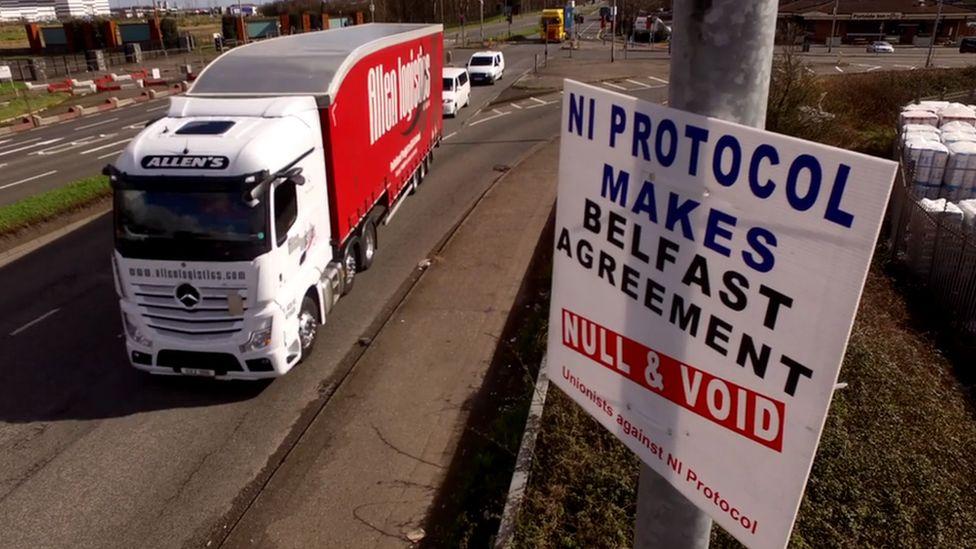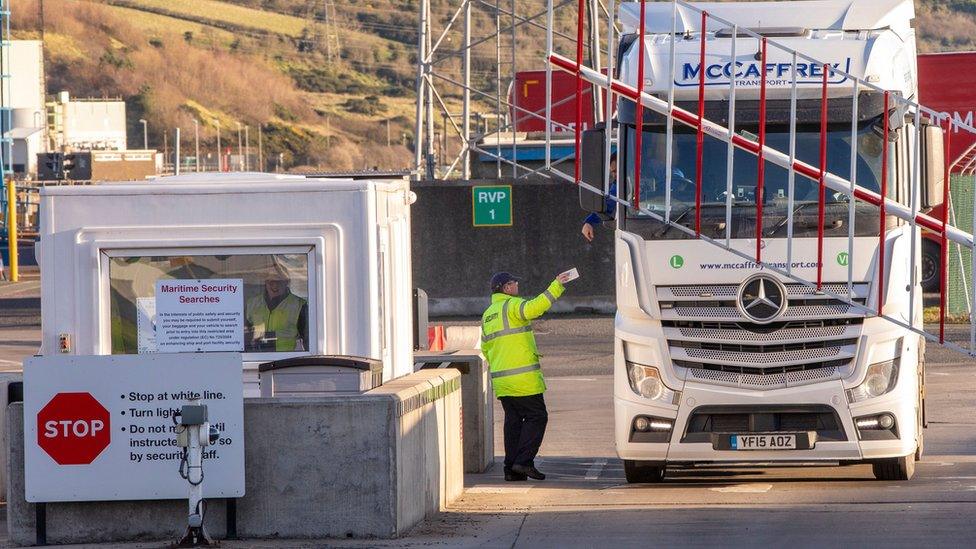Brexit: NI Protocol is lawful, High Court rules
- Published
- comments

Unionist leaders had argued the protocol was not compatible with EU law
The Northern Ireland Protocol is lawful, a High Court judge in Belfast has ruled.
A group of unionist politicians, including Arlene Foster and Lord Trimble, had challenged the protocol in judicial review proceedings.
They claimed it was unlawful because it conflicts with the 1998 Good Friday Agreement and the Acts of Union.
But Mr Justice Colton rejected their challenge on all grounds on Wednesday afternoon.
Mr Colton found that the Withdrawal Agreement Act, which includes the protocol, does conflict with the 1800 Acts of Union in respect of free trade between Britain and Northern Ireland.
However, he added that the relevant parts of the Acts of Union are "impliedly repealed" by the Withdrawal Agreement Act.
That means that the more recent legislation automatically overrides the older laws.
He said the Acts of Union could not be used to override the "clear specific will of Parliament".
Normally, a constitutional law, like the Acts of Union, can only be expressly repealed, but they can be impliedly by another constitutional law.
The judge said the Withdrawal Agreement Act meets the definition of a constitutional law.
He also rejected the argument that the protocol had changed the constitutional status as defined in the Good Friday Agreement.
Sausages, riots and the Northern Ireland Protocol
Furthermore, he found that the secretary of state did have the power to change Stormont's usual cross-community voting mechanism.
Normally, Stormont must approve controversial issues by a cross-community vote but the protocol will be subject to a straight-majority vote.
The judge said the secretary of state had the power to do this on two grounds: that it was necessary to reflect the will of Parliament in implementing the Withdrawal Agreement Act and that it concerns international relations which is not a devolved matter.
Further areas of challenge concerning EU law were also rejected.
The judge was also critical of an analogy used by the applicants' barrister when he compared the operation of the protocol to the Vichy regime.
Vichy was the collaborationist French administration during the Nazi occupation.
The judge said such a comparison was "unhelpful".
'Politically significant'
An adjoining case, taken by Belfast pastor Clifford Peeples, was also dismissed by the judge.
Others pursuing the lead judicial review case included former Ulster Unionist leader Steve Aiken, TUV leader Jim Allister, former Brexit Party MEP Ben Habib and Baroness Hoey.
'NI and GB have been severed by the Protocol'
Wednesday's judgement is likely to be appealed and the case could ultimately be heard by the Supreme Court before the end of 2021.
Prime Minister Boris Johnson said the government would "study in detail" the High Court ruling, after being asked about it during Prime Minister's Questions.
DUP MP Ian Paisley asked if the government would "reverse the mistakes of the Northern Ireland Protocol, seize the moment, defend the union to unilaterally fix and put Northern Ireland out of its commercial, social and economic misery".
Mr Johnson said: "Nothing will affect the position of Northern Ireland as part of the UK - we will make sure we uphold that."
Alliance MP Stephen Farry also urged the prime minister to accept the ruling as a "watershed where we can stop talking about the protocol in constitutional and identity terms".
The prime minister replied that the "best thing" the EU could do was remove all the problems associated with the protocol's application.
"I hope all that can be fixed indeed and then we can move on," he added.
DUP leader designate Sir Jeffrey Donaldson described the ruling as "politically significant" and would have potential consequences for "the future stability of political institutions".
In a tweet, he said the judgement confirmed the "protocol damages our constitutional position in the UK contrary to the principle of consent and various agreements".
Ulster Unionist MLA Steve Aiken said his party acknowledged the decision, but said it is "an issue of such magnitude that it needs to be appealed to a higher court".
Union 'trampled on'
Speaking at a press conference in Belfast following the judgement, Mr Habib said: "The only positive you might put on it is we do now officially know that the union of the United Kingdom has been trampled on by the protocol."
Mr Habib said the prime minister now "has to face up to the reality that his own judicial system has said that the union of the United Kingdom has been broken".
Former Labour MP Kate Hoey - now Baroness Hoey - said it must be "absolutely clear that this is only the beginning of the legal challenge and also of peoples' protests against what has been done to us without consent".
TUV leader Jim Allister said the court ruling "confirmed the protocol is dismantling the union".
Mr Allister said the ruling "underscores the necessity to step up the political battle against the protocol".
He said the UK government must "now reverse the mistake of repeal, if the PM's words mean anything".
"No more propping up the Belfast Agreement institutions while the protocol manoeuvres us out of the union," he added.
Sinn Féin MLA Declan Kearney said "there is no credible alternative to the protocol".
"It's ironic that the Tory/DUP cheerleaders of Brexit are now so opposed to the protocol that was made necessary by their reckless pursuit of a hard Brexit," he said.
Related topics
- Published30 June 2021

- Published30 June 2021
